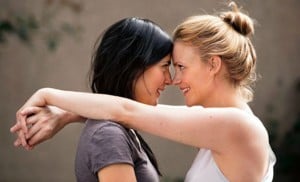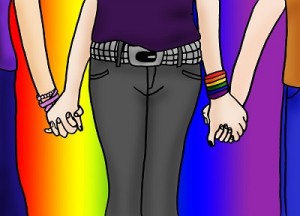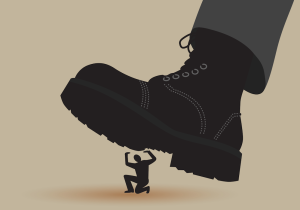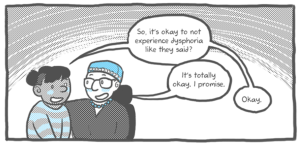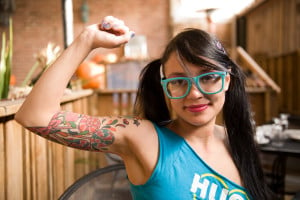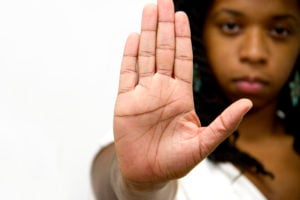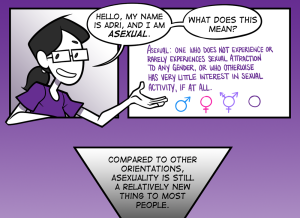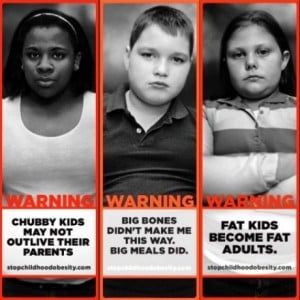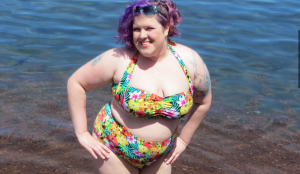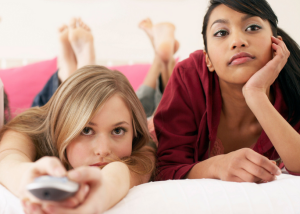
Source: Weloversize
At first glance, TV shows seem harmless and innocent. They’re only fictional stories, after all. They don’t have an effect on real life.
But the thing is, they do.
Maybe watching The Walking Dead won’t inspire you to start preparing for the zombie apocalypse, but TV shows do influence what we think and what we believe.
Think about it this way: Nobody comes into this world knowing what to do. That’s why we look to mentors – so we can get an idea of how we should be thinking, what we should be doing, and why we should be doing it.
But it’s not just mentors that we look to. We also look to books, movies, and TV shows — in short, to stories. That’s because stories are about the lives of people who are similar to us, whether it’s because of age, cultural background, or anything else.
We look to these people because they have the lives that we aspire to. Therefore, we want to know how they achieve those lives and the consequences that follow from their actions and decisions.
So when we consume media, we are looking for a reflection of our own lives, or what they could be.
If you’re not convinced, just think about Nichelle Nichols recounting what Whoopi Goldberg told her about seeing Star Trek’s Lieutenant Uhura on TV for the first time: She ran through the house and screamed, “Come quick, come quick. There’s a Black lady on TV, and she ain’t no maid!”
For Whoopi Goldberg, seeing Nichelle Nichols play such an important role offered a sense of social validation and empowerment within a society that drastically limited (and continues to limit) the depiction of how Black women can exist in the world.
After decades of only seeing Black women play maids and other stereotypical roles, little Black girls of the 60s got to experience someone who looked like them be a Communication Officer on a famous television series!
Similarly, watching Avatar: The Last Airbender as a kid proved to me that Asian characters could be heroes, just like white characters.
Put another way, TV shows can influence what you expect from your life as you grow up.
The expectations don’t have to be grand or epic either. I mean, I didn’t think that I was going to have to save the world like Aang did.
But I did think that my life would be like the lives of teenagers that I saw on TV: glamorous, adventurous, and full of romance.
Turns out, it wasn’t quite like that. I didn’t get involved in any of the drama or intrigue that fictional teenagers did. I didn’t find my first love. And I definitely didn’t have my future figured out, even after I graduated.
I was kind of disappointed – until I made an important realization: My life wasn’t like the ones of fictional teenagers because—well—nobody’s really is.
What we see on TV can sometimes be inspiring, as in the case of Whoopi Goldberg and Lieutenant Uhura.
However, it can also be deceiving. TV shows (and other media) often perpetuate myths about life – especially the life of teenaged girls.
These myths can range from how teenaged girls should look to what sorts of romantic relationships they should have. And while they might seem innocuous, they can be harmful because they promote unhealthy expectations for yourself and your life.
In the list below, I’ll list five common myths perpetuated by the characterization of teenage girls on television, explain why they’re untrue, and talk about what’s most likely to happen instead.
Lie #1: You Have to Look Magazine Cover Flawless at All Times
As a teenager, I felt insecure about the way I look. (I still do sometimes.) It’s hard to let go of the feeling that you’re not measuring up to society’s standards of beauty.
That’s because society uses the media to convince women from a young age that we’re not beautiful without the right hair, makeup, or clothes.
You might have compared yourself to the women that you see on TV and felt that you could never be that beautiful.
If you’ve done so, it’s not your fault. Internalized misogyny teaches women that we’re always in competition with each other, even though we aren’t and shouldn’t be.
It’s especially hard if you’re a teenager. I’m not a teenager anymore, but believe me, I remember what it was like to go through puberty. My hair and skin never cooperated with me, no matter what shampoo or skin cleanser I used.
What made it harder was seeing the teenaged girls on TV and wondering why I could never style my hair as cutely or why my clothes didn’t fit me as well.
It took me until adulthood to realize that the way teenagers look on TV is a myth.
Here’s the thing: The actors playing teenagers on TV have hundreds of dollars poured into their hair, skin, clothes, makeup, and pretty much everything related to their appearances.
And—well—you don’t have the same amount of money and professional care that these actors have.
So you shouldn’t feel bad if your skin isn’t clear, if your hair is oily, or if your clothes don’t fit you properly.
In addition, it’s important to remember that these actors usually aren’t teenagers.
Take Glee, for instance. Lea Michele, Naya Rivera, and Dianna Agron were all 22 years old when the show began its run — long past the awkward stages of puberty.
I’m not criticizing these actors or saying that you have to wait to be beautiful. I’m just saying that, like it or not, puberty is a long and awkward ride for everyone.
Rather than comparing yourself to people who’ve already walked that rocky road, it’s better to make peace with the fact that your body is going to rebel against your best attempts for a couple of years.
Lie #2: Sex Is the End Goal of Everything
I’m pretty convinced that HBO has a quota to meet for how many sex scenes should occur in one TV season (and Game of Thrones fulfills more than half of that quota).
Whether sex scenes on TV are implied, off screen, or even briefly glimpsed, they’re happening – and a lot of times, it’s teenagers having sex.
That’s not necessarily a bad thing. There’s been some buzz about the sex scene in Insurgent, with some people arguing that the scene is important because it portrays a young woman in charge of her own sexuality.
I agree that it’s important to show that. If you’re ready and fully consenting, then there’s nothing wrong with having sex.
But what if you don’t want to have sex yet? Will you somehow be behind in the game?
The answer is no, you definitely won’t be. Having sex isn’t a magical gateway that will usher you into adulthood.
More importantly, if you’re not ready or are unsure in the least bit, nobody has the right to force you to agree to it.
This is true of everyone, of course. But I think it’s especially important to remind young women – who are simultaneously pressured to have sex and then shamed for it – that they don’t owe anyone sex.
There are many reasons why you might not want to have sex. All of them are valid. Whether you’re not ready, insecure, or simply aren’t interested in sex, it’s okay.
Don’t let TV shows – or anyone for that matter – convince you that sex is some rite of your teenage years. It’s not. It’s something you experience in your own time, and on your own terms.
Lie #3: You’re Going to Find ‘The One’ – And Searching for Them Should Be Your Main Priority
As women, we’re often told that we aren’t worthy unless a man is romantically attracted to us. This is definitely not true.
Of course, it might be hard not to at least hope for a romance when teenagers in TV shows are finding “the one” left and right.
I’m not knocking it. It’s possible to find the person that you want to spend the rest of your life with early on. But it’s also possible, and perfectly normal, that you won’t find someone.
I wrung my hands and cursed Ryan Murphy when Brittany and Santana broke up on Glee. However, as the show reached its conclusion, they got back together and even got married.
The point the show seemed to make was that, in spite of the ups and downs in their relationship, they were meant to be together.
I’m happy that they got married, but I also know that it doesn’t always happen like that. Couples who break up don’t always get back together because they’re “meant to be.”
And just as it’s okay not to find “the one” as a teenager, it’s also okay to think you’ve found them and then discover that they’re not.
What I’m saying is that your first love doesn’t have to be your only love. If you can’t work through the problems in your relationship, then it’s okay to break it off.
You’re not obligated to keep trying or to get back together with your significant other. This is especially if true they treat you badly or are abusive.
Love is important, and it can be awesome, but you don’t have to have it all figured out as a teenager.
Which brings us to our fourth myth.
Lie #4: You’ve Got to Have Your Life All Figured Out
You might have suspected this before, but I’m here to tell you that adults don’t actually have all the answers.
I’m in my twenties, and there are still a lot of things about life that I haven’t figured out. I have friends who are in their thirties and even they haven’t got this life thing down.
So don’t let TV shows tell you that you’ve got to have your life goals planned out by the time you finish high school.
Believe me when I say that it’s perfectly normal not to know what you’re going to do with your life for a long, long time. It took me until after I finished college to figure out where my passions lie.
In the same way that you should accept that puberty will be a thing, you should also accept that not knowing a lot of stuff will also be a thing.
Try not to stress out about it. I promise that you’ll figure things out in time. It’s all part of growing up, and that (whether for good or for bad) is a long, long process.
Lie #5: We’re All White, Straight, and Middle Class (And Any Other Privileged Identity)
It’s not hard to tell that there’s a lack of diversity in TV shows. Even though characters with marginalized identities are more common than they used to be, they’re often stuck in stereotypical and narrow roles.
This is a problem because the experiences of white, straight, cisgender (and often middle class) teenagers are definitely not the experiences of all teenagers.
It’s difficult enough to match the standards that fictional teenagers present even when you’re all the things listed above.
It’s so much harder when those standards aren’t made with you in mind – or, as is often the case, when those standards are made to exclude you.
After all, how can we do the same things as fictional teenagers if we don’t have the same resources as them? Many of us don’t have financial stability, a supportive parent or mentor, or even a safe environment to grow up in.
However, just because we don’t have those things doesn’t mean that our experiences aren’t meaningful. They are, and that’s because in spite of all the things we don’t have, we still hope, dream, and try to survive.
So if you’re a teenage girl who’s marginalized in any way, know that your experiences are worthy and valid, even if you don’t see them on TV.
Your experiences might be different, and that might make it harder for you. I can’t promise that they’ll make it easier, at any rate.
But that doesn’t mean that you’re doing anything wrong, only that the experiences you see on TV are narrow and limited.
***
Being a teenaged girl is hard. TV shows, with their unrealistic expectations for what a teenaged girl’s life should be like, make it harder.
But the thing about TV shows (and other media) is that they tend to glamorize life and life’s experiences.
That’s why it’s important to approach media with a critical lens. Whether TV shows are realistic or not, it’s totally okay to enjoy them. I know that I do. I just don’t take their word for it that this is what life is supposed to be like.
Whether it’s about your looks, your sex life, your love life, or your future plans, you don’t have to feel bad because things aren’t going the way that your favorite character’s life is.
Your life is your own, after all. You can make of it whatever you want.
[do_widget id=”text-101″]
Kerry Truong is a Contributing Writer for Everyday Feminism. They are a queer diasporic Vietnamese womxn and graduated this spring with a double degree in English and Asian American Studies. When they’re not philosophizing about this at length, they’re reading, taking long walks, or cooing over all the dogs who cross their path. Read their Everyday Feminism articles here.
Search our 3000+ articles!
Read our articles about:
Our online racial justice training
Used by hundreds of universities, non-profits, and businesses.
Click to learn more





